- Home
- Media Kit
- MediaJet
- Current Issue
- Past Issues
- Ad Specs-Submission
- Ad Print Settings
- Reprints (PDF)
- Photo Specifications (PDF)
- Contact Us
![]()
ONLINE
![]()
ONLINE

A Bridge Builder
Editors’ Note
T.D. Jakes, leverages his pioneering vision and instinct to serve others in areas extending beyond the church. He believes that in order to help lead people to their destiny, you have to meet people where they are in life. It is with this earnest approach that Jakes has been able to reach millions of people from all socioeconomic backgrounds, races, nationalities, and creeds. Digital media, film, and television, among others, have been instrumental in helping Jakes meet the disparate needs of countless individuals.
In September 2016, he launched The Jakes Show, an intellectually invigorating, yet practical daytime talk show, where Jakes helps his guests lead empowering lives through candid conversation. As a visionary leader, he encourages you to think differently – and progressively – so that you can create a more meaningful life experience that is truly your own. The adage, “Give a man a fish and you feed him for a day; teach a man to fish and you feed him for a lifetime” is the bedrock of Jakes’ visionary leadership.
For more than 40 years, he has helped millions of people realize their purpose through his dynamic ministry. Recognized as “America’s Best Preacher” by Time Magazine, as well as “One of the Nation’s Most Influential & Mesmerizing Preachers” by The New York Times, Jakes remains a charismatic, yet humble man. In 1996, with minimal resources, he founded The Potter's House (TPH), a non-denominational, multicultural church and global humanitarian organization, in Dallas, Texas. The church has since expanded to include more than 30,000 members, with more than 50 diverse ministries. While TPH, located in southern Dallas, is the designated home to numerous members, Jakes has fulfilled the needs of those residing in the northern and western regions of the Dallas-Fort Worth metroplex, as well as out-of-state. TPH campuses are also present in Frisco and Fort Worth, Texas, as well as Denver, Colorado.
Jakes faithfully serves his local and global communities to embolden those who are marginalized, from Dallas, Texas to South Africa to Sydney, Australia. “The Potter’s House charter is to extend a hand of help to the needy, a heart of compassion to the hurting, and a message of empowerment to the disenfranchised.” To this end, Jakes provides a welcoming church environment to all. The diversity displayed throughout TPH is what makes it a truly progressive church, serving people of every socioeconomic status, age, nationality, and race. Each year Jakes helps underserved communities through TPH ministries, including homeless outreach, GED/literacy programs, and AIDS outreach. Jakes also empowers communities through distinct national ministries, including Global Partner System (GPS), MegaCARE, and Texas Offenders Reentry Initiative (T.O.R.I.). With a steadfast love of people, TPH is consistently ranked among the nation’s most influential churches each year.
A proclivity to disrupt the status quo, Jakes is one of the most coveted faith-based influencers in business, education, film, and entertainment. He has advised the last three presidents; in 2009, he was a featured speaker at the inauguration of Barack Obama; and in 2011, he gave remarks at a White House Easter Prayer Breakfast. From Savoy Magazine recognizing Jakes as one of the “Top 100 Powers That Be” to Ebony Magazine honoring him on their “Power 100 List,” Jakes continues to show the world how to lead with purpose. While Jakes possesses myriad leadership qualities, his ability to leverage his linguistic prowess, strategic insights, and servant spirit is unparalleled. Some of the most successful business executives and leaders travel from all over the world to seek his counsel. Jakes has offered his insights at diverse forums, including The Aspen Institute, The Willow Creek Leadership Forum, and The SMU Tate Lecture Series, among others. His efforts have helped some of the world’s most illustrious leaders elevate their brands to the next level.
Jakes also connects communities from across the globe through various multicultural conferences. For more than a decade, MegaFest continues to receive international recognition as the nation’s largest faith and family festival. This conference draws upwards of 100,000 attendees from as far as Singapore and China. Additionally, Jakes offers entrepreneurs, pastors, and leaders an opportunity to hone their leadership skills through the International Pastors and Leadership Conference.
Named “America’s Treasure” by Oprah Winfrey, Jakes is a master communicator for all ages. He offers a collection of award-winning and New York Times best-selling books, including Destiny: Step Into Your Purpose, and Instinct: The Power to Unleash Your Inborn Drive. In the entertainment space, Jakes has numerous film credits to his name, including the award-winning romantic comedy, Jumping the Broom, among others.
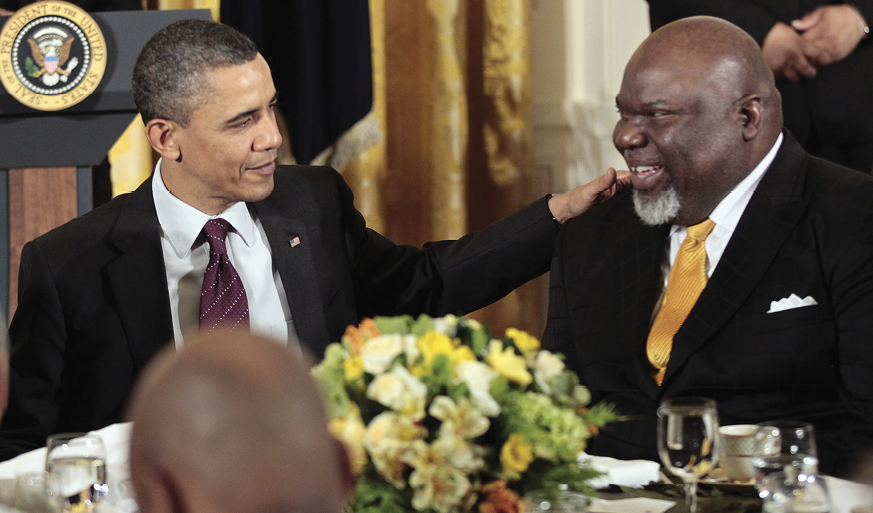
U.S. President Barack Obama with T.D. Jakes
Will you discuss your life’s journey and how your passion and commitment for serving and inspiring people developed?
I was born and raised in Charleston, West Virginia where I grew up the youngest of three children. As a child, my nickname was “Bible Boy” because I used to carry my Bible with me everywhere, preaching to an invisible congregation as I went. At 17, I was called to preach, and in 1979, I started my first church in Montgomery, Virginia with just 10 congregants.
From a young age, I learned the value of hard work from my parents. My father’s business started with just a mop and a bucket, and over the years he grew it into a janitorial service with 42 employees. My mother was an educator and a keen real estate investor. She taught me the importance of seeking truth, pursuing knowledge, and using business as a force for good. I applied these principles to my own calling and purpose: using communication as a tool to help others achieve their destiny.
What was your vision for creating The Potter’s House and how do you define its mission and purpose?
After years of moving our congregation from small town to small town in West Virginia, in 1996, I decided to relocate my family to Dallas along with 50 other families. Together, we established The Potter’s House. Our first church service drew more than 2,000 people, and since then, the membership has grown to over 30,000. Our mission at The Potter’s House is to become a global voice, offering a lifelong journey of spiritual and economic hope, encouragement, and empowerment to people locally, nationally and around the world.
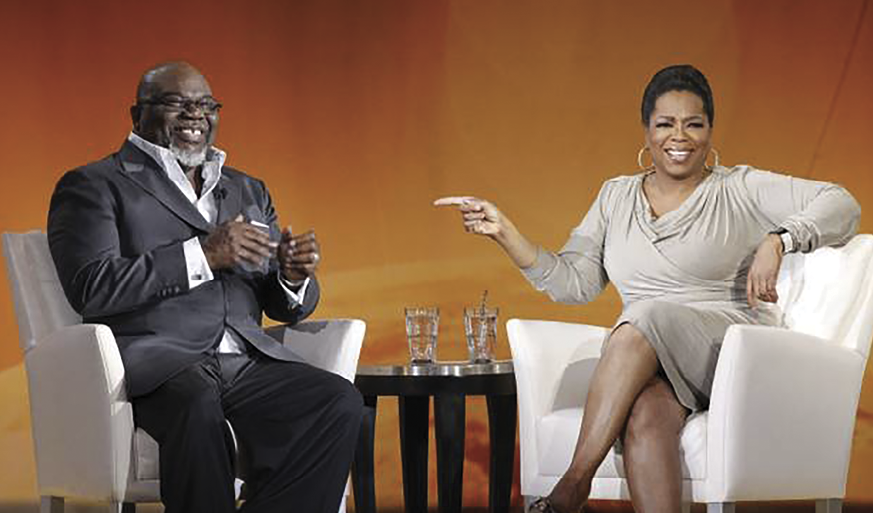
T.D. Jakes with Oprah Winfrey
In a very practical sense, our church strives to be the hands and feet of Jesus. And I’m talking about physically, tangibly. For us, this mission drives us to pinpoint areas where people – both here in Dallas and across the globe – need help and to create innovative solutions to address these issues.
For example, The Potter’s House has a ministry called Capable Minds, Hearts & Hands, which caters to the needs of our parishioners with intellectual or developmental disabilities (IDD). We created a special place called “The Sensory Room” to provide a multi-sensory, immersive, and balanced environment within the church. In this room, folks with IDD or Autism can develop their sensory skills through music therapy, relieve stress and anxiety in the reading corner, or test their tactile, motor, and cognitive skills in special development areas.
Another program I am particularly proud of is the Texas Offenders Reentry Initiative (T.O.R.I.), which was founded in 2005 to provide returning former inmates and their families with holistic, wraparound services that foster positive lifestyle changes for ex-offenders. Through T.O.R.I., we help returning citizens find employment, education, housing, healthcare, spiritual guidance, and assist them in reuniting with their families. Since launching, we’ve helped more than 30,000 former inmates improve their lives, including some who went on to work at Dallas-based AT&T.
During the last 25 years, The Potter’s House United MegaCare ministry has successfully constructed a 10-mile pipeline to provide clean water for the people of Kenya, built 14 water stations to combat water scarcity across the African continent, constructed a three-story wing in Nairobi’s Melchizedek Hospital, transported truckloads of food to countries around the world suffering from famine, participated in disaster relief efforts after hurricanes and earthquakes in the U.S. and Haiti, built a children’s center for more than 300 Zambian children orphaned by AIDS, and much more.
Our church also has a ministry for the deaf and the hard of hearing. We have a prison ministry, a hospital and nursing home ministry, a military veterans ministry. You name it, and we’ve probably got it.
Church at The Potter’s House extends far beyond the walls of the sanctuary and into the neighborhoods, communities and families we serve. As a recent example, during the height of the COVID-19 pandemic, The Potter’s House led an initiative that delivered over 10,000 meals to area hospitals, fire stations, clinics, urgent care centers and police stations. Every week, our people delivered meals to emergency first responders, and through additional partnerships, The Potter’s House supplied life-saving PPE to these same area organizations. We also partnered with the U.S. Department of Agriculture, the City of Dallas, and Services of Hope to help with food insecurity across the state of Texas. As a result of this collective impact, more than 5,000 boxes of food were put directly in the hands of Texas families.
While many ministries were left scrambling by the stay-at-home measures implemented at the start of the pandemic, The Potter’s House understood the value in virtual worship long before it was necessary. Since 2020, our church has seen an exponential rise in livestream worship attendance. Currently, our YouTube channel has more than 1.85 million subscribers, and our videos on that channel have over 300 million views and counting. Every Sunday, we stream our services live to thousands of people around the world. In this way, we are looking toward the future of worship, creating an environment where anyone with an internet connection can easily attend service every week, no matter where they are in their lives.
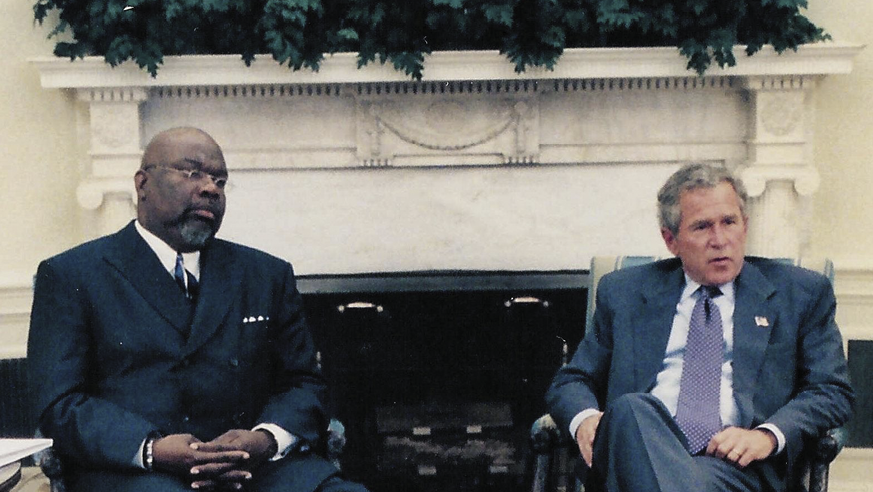
T.D. Jakes with U.S. President George W. Bush
We are active members of the communities where we are planted, which is what I believe the Church is supposed to be.
What was your vision for creating the T.D. Jakes Foundation and how do you decide where to focus the resources and efforts of the Foundation?
After 45 years in the ministry, I am turning my eyes to the future and putting my attention on the legacy I want to leave behind long after I am gone. I know that my eventual successor at The Potter’s House may not be as passionate about the same community issues that I am, so my goal with the T.D. Jakes Foundation was to create an avenue for providing long-lasting solutions to the issues I care so deeply about. For me, that means pinpointing innovative new ways to prepare people for success in the 21st-century workforce, uplift underserved populations, and connect corporations to new, highly-skilled pools of talent.
As a Black child growing up in West Virginia during a very turbulent time in our country’s history, I lacked access to the quality education my white peers received. This is an issue that has plagued people of color since long before I was born, and it unfortunately continues to this day. I always say that you can’t climb the ladder if you’re not near the steps, so I launched the T.D. Jakes Foundation in 2020 to help solve the still-present opportunity gap for underserved students and workers. That is the purpose of the Foundation and where we are spending our time and resources.
While the Foundation has only been around for two years, it really is a result of decades of relationships and partnerships I have established over the course of my career. We work closely with Microsoft, AT&T, Goldman Sachs, the NBA’s Dallas Mavericks and many other leading businesses to build programs and initiatives that can have a net positive impact on an entire generation.
Throughout my life, I have always been a bridge builder – making connections between people of different ethnicities, different faiths or different political parties. I have found that problems can only be truly solved when we take a moment to consider someone else’s point of view.
I recently spent time with more than 300 of the world’s top CEOs to discuss diversity, equity and inclusion in the workplace. What I found through these conversations is that most business leaders genuinely want to be part of enacting positive change, but many simply don’t know where to direct their dollars to achieve the best results. Creating partnerships to bring about collective impact is a solution to that problem, and that’s what the T.D. Jakes Foundation is all about.
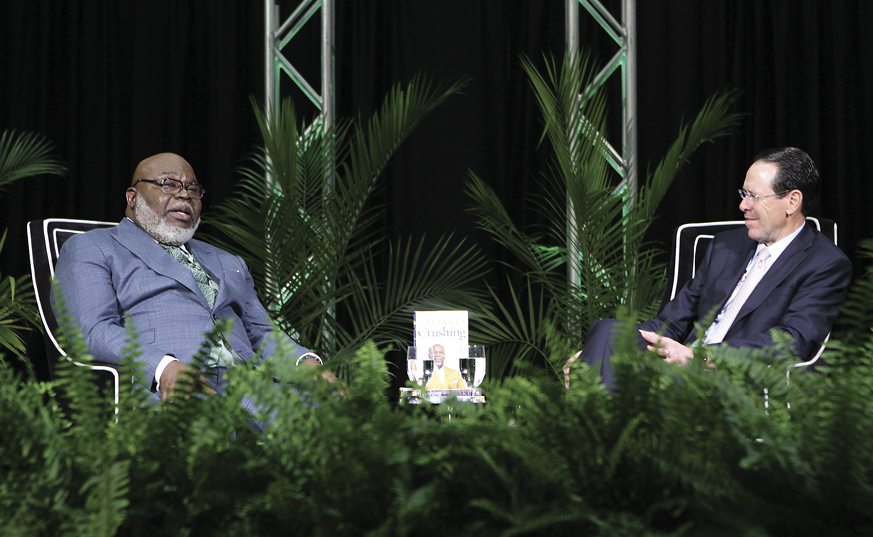
T.D. Jakes with former AT&T CEO Randall Stephenson
The T.D. Jakes Foundation champions STEAM curriculum for underserved students in its STEAM Academy. Will you elaborate on this effort and the impact that you hope to make through the STEAM Academy?
STEAM (Science, Technology, Engineering, the Arts and Math) careers are among the fastest growing and highest paying jobs on the market, and for that reason, we place a strong emphasis on providing STEAM education and training for people of all ages. The goal is to ensure that everyone – regardless of race, gender, or economic status – has the tools to succeed in the 21st century workforce. You can’t get a STEAM job without first gaining exposure, knowledge and experience in STEAM fields. That is why we started the STEAM Academy.
Last year, we partnered with Frito-Lay, Dallas Summer Musicals, the Moody Foundation, the Meadows Foundation, Dallas Independent School District (DISD) and iDTech to provide a Hamilton-themed STEAM program to DISD students. The program taught students how to create their own original Hamilton marketing materials, including printed posters and video trailers, using Adobe Premiere and Adobe Photoshop. The iDTech staff provided detailed lessons on the Adobe software programs at the beginning of each session, and Dallas Summer Musicals teaching artists provided a connection to theatre and to Hamilton, with a focus on cultural awareness and racial equity.
The program culminated with an exclusive Hamilton performance for students and their families. In total, 3,000 students, 36 teaching artists and 18 DISD teachers across 60 classrooms participated in the program, prior to which 92 percent of students had never used Adobe Premiere, and 76 percent had no familiarity with Adobe Photoshop.
In June of this year, we hosted our third annual STEAM Academy – a Hackathon presented by the Dallas Mavericks and powered by Goldman Sachs. It was a two-week immersive experience where 500 students ages 14-18 worked directly alongside a Goldman Sachs engineer. They learned how to ideate, how to prototype an idea and how to communicate that in an impactful way.
Each year, we focus on a different area in the STEAM fields, and there’s always an emphasis on the arts. Last year, it was artistic design, layout, video editing and learning about the world of theatre and performing arts. This year, there was a storyboarding and public speaking component.
Children cannot be what they cannot see. Our goal for the STEAM Academy is exposure. Let’s expose students to the things that will give them the best advantage when entering the workforce in 5-10 years.
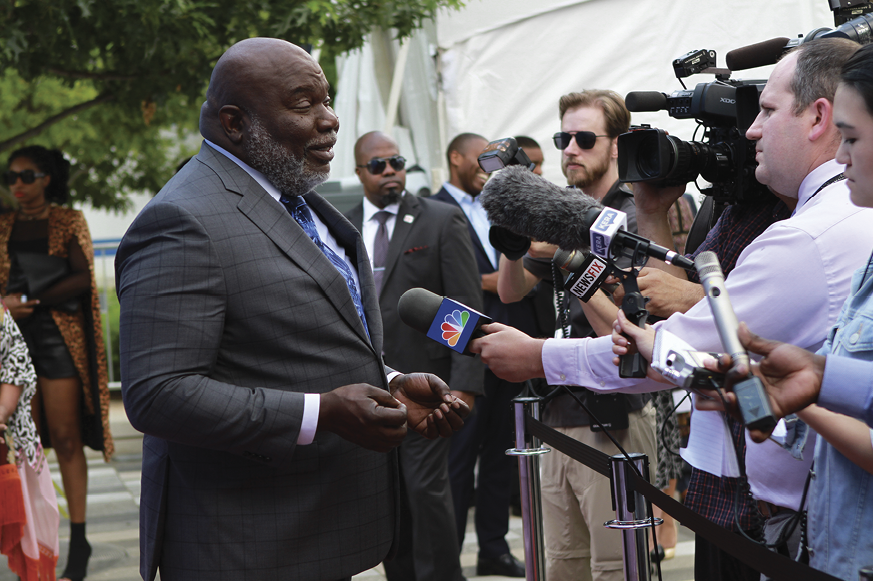
T.D. Jakes speaking to press at 2017 MegaFest
You founded T.D. Jakes Real Estate Ventures to create attainable and sustainable communities in a global marketplace. Will you discuss your commitment to develop affordable housing and your plans to build an affordable housing and entertainment district on 95 acres of land in Atlanta, adjacent to Tyler Perry Studios?
Throughout the country, I have seen far too many Black and brown working-class people falling victim to the continued gentrification of our neighborhoods. Our vision for T.D. Jakes Real Estate Ventures (TDJREV) was to develop an oasis within our cities for working families, walking them toward economic viability through financial literacy programs, live-work spaces, mixed income housing, and multigenerational options that are imperative to the betterment of society.
At Fort McPherson, which is the land adjacent to Tyler Perry Studios, we want to ensure citizens of Atlanta will have the opportunity for new affordable housing and cultural space right in their ancestral neighborhoods. I am so excited about that project, and I sense the people of Atlanta are as well.
We are doing something similar at Capella Park, a 400-plus acre mixed-income community in south Dallas, and I am looking forward to watching all of this come to fruition.
You are an award-winning and New York Times best-selling author. What interested you in writing books and what are the key messages you want to convey through your books?
In everything I do, whether it’s preaching, producing films and music, or writing books, I use the power of communication as a tool to connect with people, teach them and hopefully change their lives. For me, writing books is yet another avenue to reach people.
I’ve written books on a variety of topics – the power of communication, entrepreneurship, forgiveness, finding your destiny, you name it. I write about things I’ve learned and discovered throughout the course of my life that were revelations to me, in hopes that they might be helpful to someone else. We all have to help each other. If you’ve figured something out, I want to know about it. Let’s share our wisdom. I’ve written 41 books so far and the process of writing is something I enjoy; it’s a discipline that challenges me to stay consistent and on top of my game.
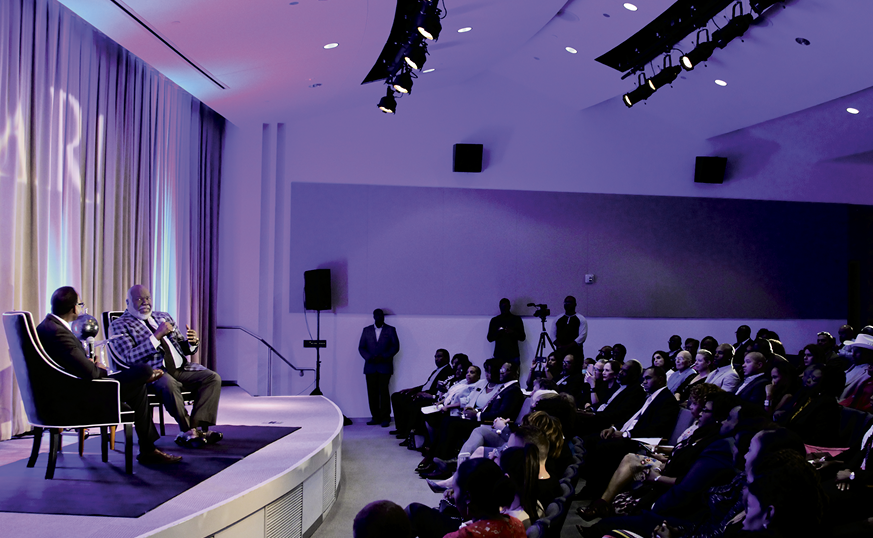
T.D. Jakes speaking to a crowd at Frontiers of Flight Museum
What do you feel are the keys to effective leadership and do you feel that leadership skills can be taught or is a person born with them?
I believe that much of effective leadership is instinctual. We instinctively know how to lead if we allow ourselves. While there are certain qualities and traits that a person can be born with that might make him or her more of a natural leader, I do believe everyone can lead, and everyone can learn how to be a more effective leader.
One of the most common and detrimental mistakes a leader can make is operating independently as a part of a team. Think about this: if you start trying to lift something you can’t carry, you will see how many people come to help. But pick up a box you can manage, and everyone will simply watch you carry the load. Leaders must cast a vision that is too large for them to carry alone. That is what allows your team the opportunity to step up and help carry the load further than you could have ever done it by yourself.
When you look at the polarization that is prevalent within the country, how can people be brought back together and what can be done to open effective communication between people with differing views and beliefs?
Our society is in trouble right now because we have lost the art of listening – and there is so much noise to sort through in this world. Through social media, everyone has a platform to share their opinions and thoughts, so we have a planet full of people talking at each other without anyone taking the time to listen. I’ve said it before, but I believe things would be vastly improved if we could all take a moment to consider someone else’s point of view. You don’t have to agree with the other person, but simply listen to what they are saying.
“Do unto others as you would have them do unto you.” We must not become so committed to winning an argument that we lose our humanity in pursuit of scoring points on the other side.
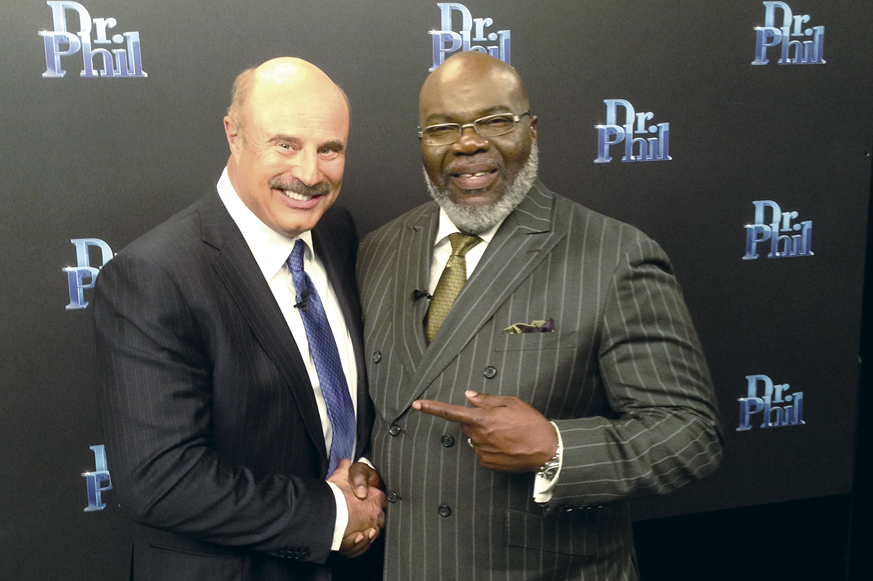
Dr. Phil McGraw with T.D. Jakes
As we witness so much unrest around the world and a continued onslaught of divisiveness, violence, inequality, and pain here in our own country, my deep hope for humanity is that we can all become our brother’s keeper.
This is not a country of red and blue states, it’s a country of mothers and fathers, of sisters and brothers. Despite our many differences, we all want the same things at the end of the day – a comfortable place to call home, the opportunity to succeed in our chosen fields, and a safe and happy life for our children. It is well past time for us to open our arms to a unified human family and start displaying the structural empathy needed to ensure that freedom and justice for all is more than just a platitude.
The world is facing multiple crises, from public health to social justice to climate change to geopolitical conflicts. What advice do you offer to young people who are growing up and beginning their careers during this uncertain and challenging time?
We tend to forget with each passing generation the trials we faced in the last. Throughout history, we have confronted and overcome countless periods of strife. I grew up in the '60s in the shadow of the Vietnam war, political assassinations, racial tensions and riots. Before that it was World War II, and before that, the Depression.
While it may feel to us in the present as though there is nothing but bad news everywhere we look, what we are experiencing today is not new. I remember feeling the same way as a young man – the hardship and chaos around me seemed impossible to resolve, and yet we persevered. We have been down this road before, and each time a new generation has been able to bring the innovation and creativity needed to solve and move past even our hardest issues. It’s a long and laborious process, but I believe humanity is more than up to the task.
To young people, I say, “It’s your time!” We desperately need young people in the workforce today. We need their ideas, we need their energy, and we need their expertise. The fact is most of the jobs that will exist in 2030 haven’t even been invented yet. We need young people to sharpen their skills and be ready to lead in areas that are not native to people in my generation. I am focused on the future, and I am inspired by what I see in the hearts and minds of our youth.
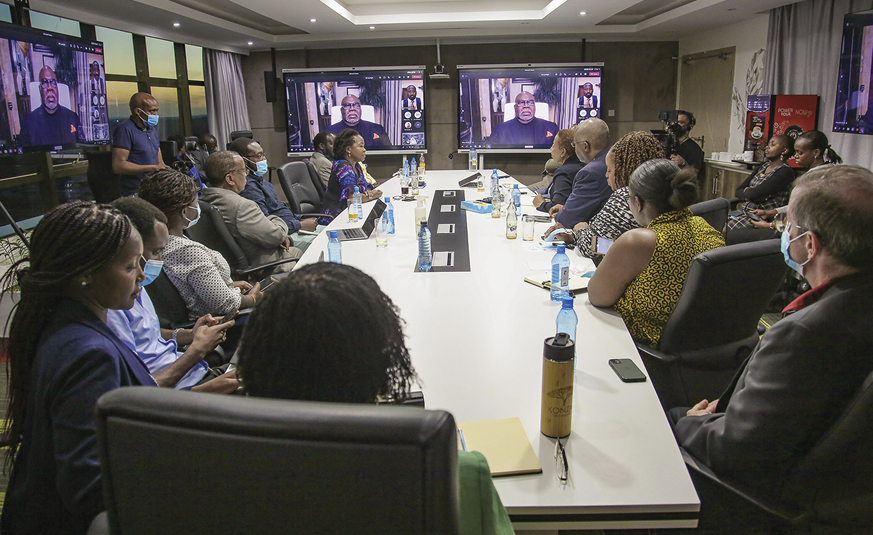
T.D. Jakes speaking to Kenyan business leaders in 2021
You have inspired so many people during your lifetime. Who are some of the people that inspire you and how have they impacted the way you deliver your message?
I have been deeply moved by the work of people like Dr. Martin Luther King Jr., Nelson Mandela, Mahatma Gandhi, and Ambassador Andrew Young. I am most inspired by those who leverage their influence to confront obstacles and bring about massive change.
To that end, I have found myself very inspired by the young people I see in the world today speaking out and demanding change. They are concerned about many things – the climate, the economy, and insuring an equitable future for everyone, no matter their race, socioeconomic circumstances, or gender. It takes great courage to stand up for what is right, and that courage cannot and should not be ignored. I am encouraged by their continued optimism and tenacity, and have no doubt that their engagement on these crucial issues will have a positive impact on the future.
You have said that great preaching is almost musical and has a rhythm. What do you see as the keys to communicating effectively and reaching your audiences?
I have often said, “What good is communication without connection?” Indeed, the whole point of communicating – whether it be with one person or a large group – is to form a connection with them. I may understand the text I’m preaching from, but if I don’t understand my audience, I will have failed as a communicator. I always have to make sure I’m communicating in a way that people can understand. That’s why Jesus spoke in parables. He catered his message to his audience.
If my sermons only contain references to things that happened 50 years ago, I am not connecting with a large portion of my congregation. To stay effective and relevant, I may need to adopt new references.
I’ve discovered it’s crucial to surround myself with people of all ages, ethnicities, lifestyles and backgrounds, because it sharpens my ability to connect with as many kinds of people as I possibly can.
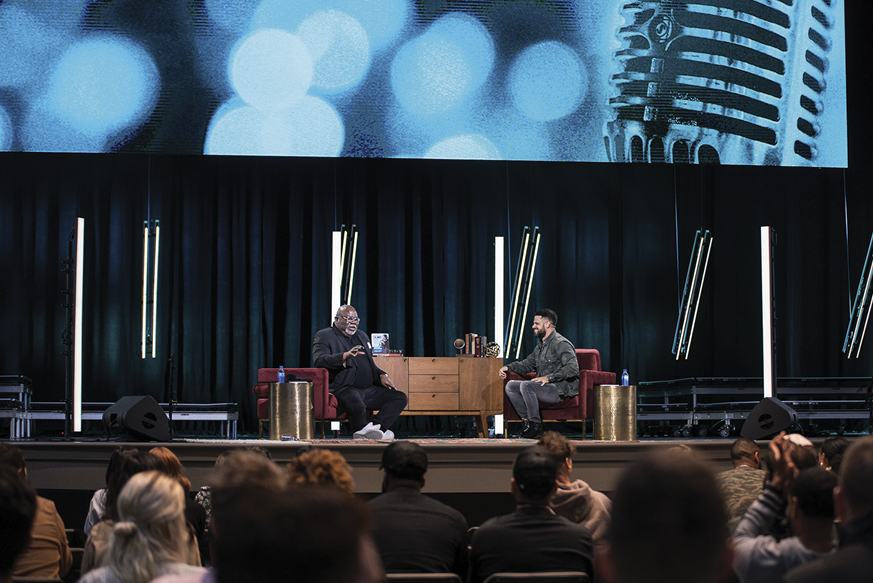
T.D. Jakes speaking with Steven Furtick
How critical is the art of listening to being a good speaker?
I mentioned earlier that we’ve lost the art of listening. Listening is critical to being a good leader, a good speaker, a good friend. Talking without listening first is a dangerous activity. That is true of everyday conversations, but it’s also true in the context of any public speaking opportunity.
Listen carefully to the person who is speaking before you. Listen carefully to the questions being asked of you. You may have a wonderful speech prepared, but if you are unaware of the context surrounding your speech, you’re going to be in trouble. Listening allows you to empathize. Listening allows you the opportunity to make connections for your audience you might not have been able to make if you were not paying attention.
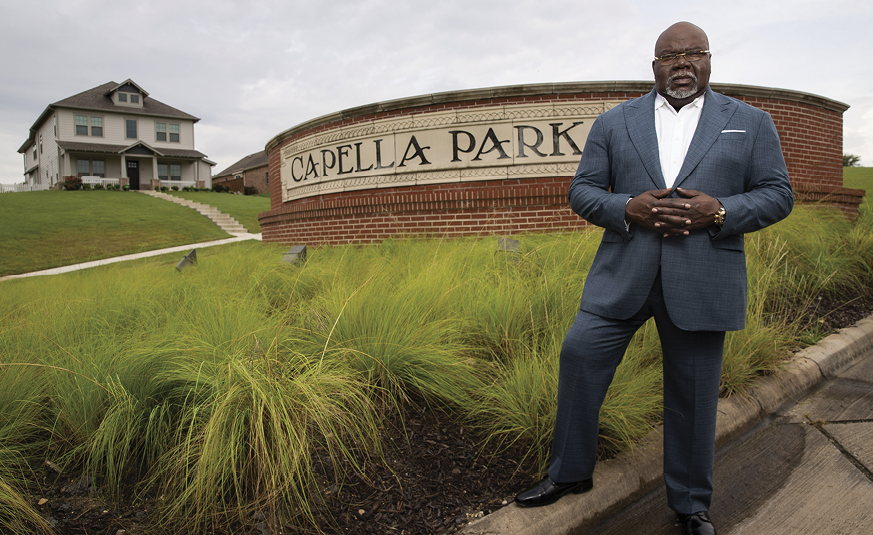
T.D. Jakes at Capella Park, a residential community
near The Potter’s House in Dallas, Texas
You have accomplished so much during your career and have impacted countless lives. Are you able to enjoy the process and take moments to appreciate what you have achieved or are you always looking at what is next?
The answer is yes! I deeply enjoy the process, and I love what I do. Working is something that has always come naturally to me; my father modeled working for me; my mother modeled working for me; we are workers! I’m just so grateful that my life’s work has made some kind of an impact.
I consider it my greatest privilege to serve people. Everything I have done and continue to do is born out of God’s calling on my life to minister and help others in some way. The most gratifying thing for me is to see someone else’s life transformed positively – whether that be spiritually, relationally, professionally, or financially. In that way, we’ve had countless mini-celebrations over the past 45 years of my ministry.
.png)
T.D. Jakes breaking ground for Clay Academy in Dallas
I do believe it’s necessary to take a step back occasionally to acknowledge successes and celebrate one’s accomplishments. We did that in June at my 65th birthday celebration, and it was a wonderful occasion. But at the same time, I’m not one to sit back and watch the grass grow either. There’s always more good work to be done.
With all the different hats I wear in our real estate projects, the exciting work of the Foundation, our entertainment initiatives, and The Potter’s House and its many ministries, I find myself uniquely positioned at the intersection of ministry and marketplace – I feel called to bring together the humanitarian goals of my ministry and the inner workings of the free market, as real change can only happen when those in power are made to see the value in taking decisive action. I want to be a good steward of not only what God has given me, but also where He has placed me at this time.
Here’s to the next 45, and the next after that! I may not be here to see it all, but I know the future is in good hands.![]()